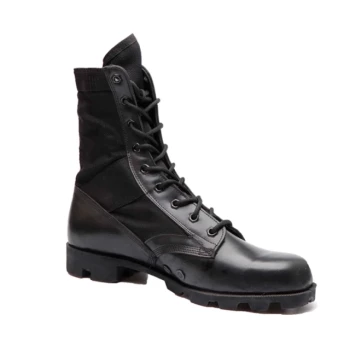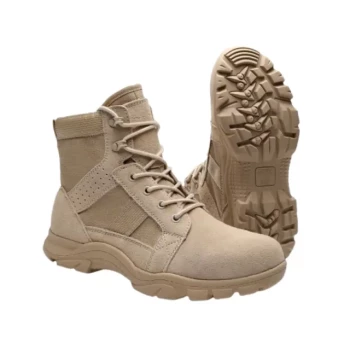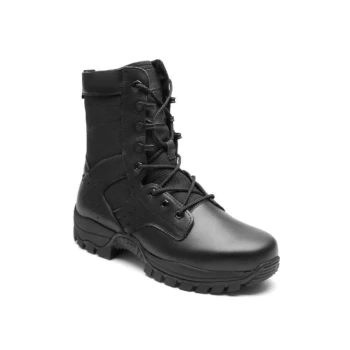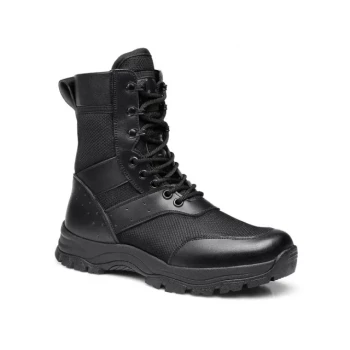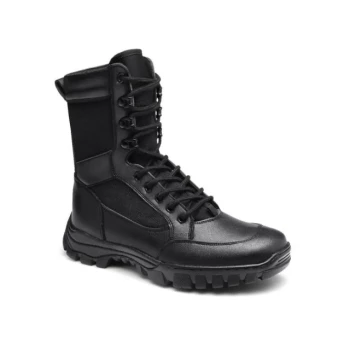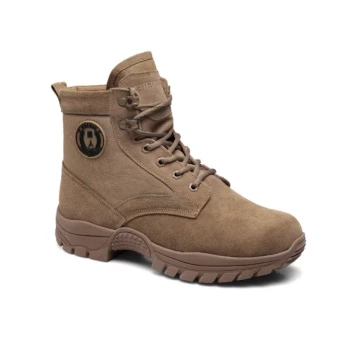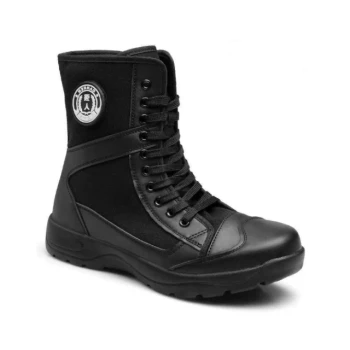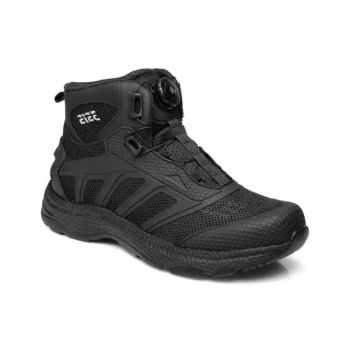In army combat boots, 1600 denier nylon is a high-performance synthetic fabric used for critical components like mesh panels and laces. Its significance lies in providing an exceptional balance of extreme durability, tear resistance, and water resistance, while simultaneously allowing the boot to remain lightweight and breathable for the soldier's foot.
The use of 1600 denier nylon represents a core principle of modern combat gear design: achieving maximum resilience and protection without compromising the user's physiological needs for comfort and mobility during extended missions.
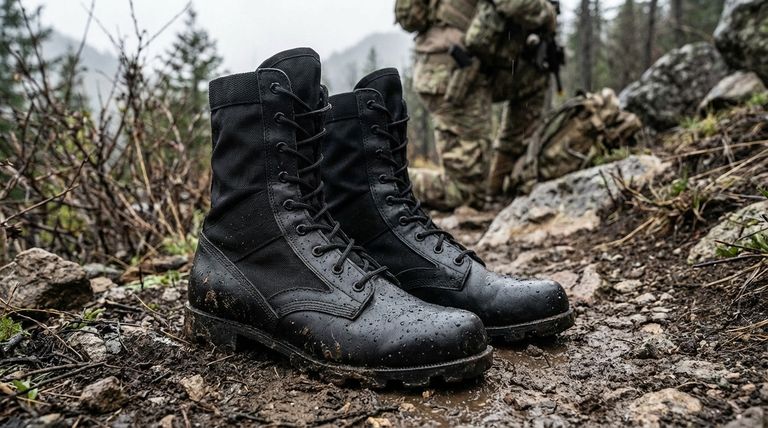
Deconstructing "1600 Denier": A Measure of Toughness
The term "1600 denier" is not just a marketing label; it is a technical specification that directly translates to battlefield performance. Understanding this specification reveals why it's a superior material for military applications.
What "Denier" Means
Denier is a unit of measurement for the linear mass density of fibers. It tells you the weight in grams of 9,000 meters of a single fiber strand.
A higher denier number indicates a thicker, stronger, and more durable fiber. For context, a single strand of silk is 1 denier, while light clothing might use fabrics under 100 denier. At 1600D, this nylon is an exceptionally robust, heavy-duty material.
Unmatched Abrasion and Tear Resistance
The primary benefit of this high density is its incredible resistance to physical damage. In combat boots, this material is used for the mesh outer layer and laces.
These components are constantly subjected to friction from rocks, debris, and equipment. The 1600D fabric resists fraying, tearing, and abrasion, ensuring the boot's structural integrity in punishing terrains.
The Critical Balance: Protection vs. Performance
While durability is paramount, a combat boot must also be a functional piece of equipment that supports the soldier's health and effectiveness. This is where 1600D nylon's other properties become essential.
A Breathable Barrier
One of the most significant advantages of 1600D nylon is its ability to be both watertight and breathable.
The dense weave resists the penetration of water from the outside, keeping the foot dry in wet conditions. Critically, it also allows sweat vapor to escape from inside the boot, which is vital for preventing blisters and more serious foot conditions.
Reducing Weight, Enhancing Mobility
Army combat boots are traditionally made with flesh-out cattlehide leather. While excellent for support and protection, a full-leather boot is heavy.
By incorporating 1600D nylon panels, boot designers can significantly reduce the overall weight. This reduction in weight directly translates to less fatigue for the soldier over long marches, preserving energy and combat effectiveness.
Understanding the Trade-offs
No material choice is without its compromises. Acknowledging them provides a complete picture of why 1600D nylon is part of a larger system.
A Component, Not a Replacement
It is crucial to note that 1600D nylon works in conjunction with cattlehide leather, not as a replacement for it.
The leather provides the core structure, ankle support, and a specific type of ruggedness. The nylon is integrated into panels to add targeted abrasion resistance and breathability where flexibility is needed most.
Water-Resistant, Not Waterproof
While the reference material uses the term "watertight," it is more accurate to describe woven fabrics like nylon as highly water-resistant.
It will repel splashes, rain, and moisture effectively. However, for complete waterproofing during full immersion, it typically relies on a separate internal bootie or membrane.
Making the Right Choice for Your Goal
When evaluating boots, understanding the role of 1600D nylon helps you align features with your primary requirements.
- If your primary focus is maximum durability for harsh environments: The presence of high-denier nylon panels is a clear indicator of a boot built to withstand extreme abrasion and tearing.
- If your primary focus is long-duration comfort and foot health: This material signifies a design that prioritizes breathability and moisture management, reducing the risk of blisters and fatigue.
- If your primary focus is military compliance: Recognize 1600D nylon as a key material used to meet AR 670-1 standards, which demand a synthesis of durability, comfort, and function.
Ultimately, the inclusion of 1600 denier nylon is a testament to the sophisticated material science behind modern, high-performance combat boots.
Summary Table:
| Key Feature | Significance for Combat Boots |
|---|---|
| Extreme Durability | Resists abrasion, fraying, and tearing from harsh terrain and debris. |
| Tear Resistance | Maintains structural integrity of mesh panels and laces under stress. |
| Water Resistance | Repels external moisture while remaining breathable to manage sweat. |
| Lightweight | Reduces overall boot weight compared to full leather, minimizing fatigue. |
| Breathability | Allows sweat vapor to escape, crucial for foot health on long missions. |
Need High-Performance Combat Boots for Your Team?
As a large-scale manufacturer, 3515 produces a comprehensive range of military and tactical footwear for distributors, brand owners, and bulk clients. Our production capabilities encompass all types of durable boots and shoes, integrating advanced materials like 1600 denier nylon to meet the highest standards of protection and comfort.
Let us help you equip your personnel with gear built for the mission.
Contact our expert team today for a consultation on your specific requirements.
Visual Guide
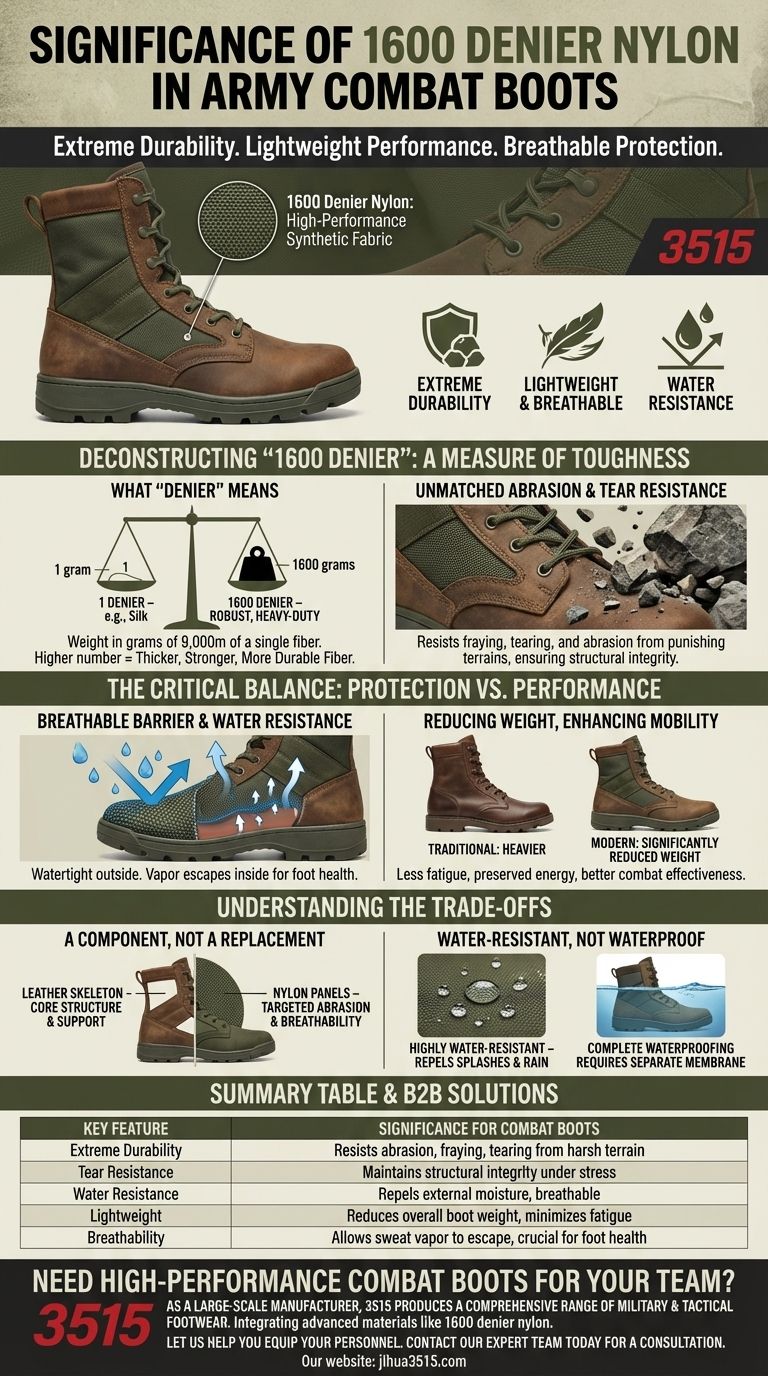
Related Products
- Durable Military Combat Boots with Water Drainage for Wholesale & OEM
- Wholesale Waterproof Tactical Boots Custom Suede & High-Traction Soles
- Wholesale Lightweight Tactical Boots Custom Manufacturer for Desert & Combat Use
- Durable Leather Tactical Boots Wholesale & Custom Manufacturing for Brands
- Durable Leather High-Ankle Tactical Boots for Wholesale & Custom Manufacturing
People Also Ask
- How did combat boots transition from military use to popular culture? From Battlefield to Fashion Statement
- What boots does the army use? The Ultimate Guide to Tactical Footwear
- How does the new boot address puncture resistance? With a Flexible Ballistic Fabric Shield
- What is the historical connection between chukka boots and the British Army? From Polo to WWII Deserts
- What was the primary motivation for developing this new jungle boot? Solving Critical Failures in Tropical Warfare
- What makes navy blue desert boots unique? A Modern Twist on a Timeless Classic
- What is the purpose of the foam layer in the new jungle boot? The Key to Durability and Comfort
- What was the significance of the 1990s for the brand? Forged a Legacy of Military Durability & Eco-Innovation
